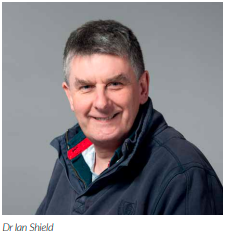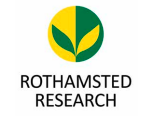Dr Ian Shield, Rothamsted Research, explains how this venerable farming research institution is now working directly
with farmers to increase knowledge transfer
Whilst you’ve probably heard of Rothamsted, the world’s oldest agricultural research centre, it’s possible you won’t have dealt with us directly, or maybe even been aware of what impact we’ve had on the way you farm. However, thanks to a new citizen science initiative, that could all be about to change. Traditionally, the evidence we’ve produced has made its way into the farming community through indirect routes – either by influencing policy; through the best practice advice given out by agronomists and consultants; or via its impact on the wider agricultural industry.
Our founder, Sir John Bennet Lawes, formulated superphosphate, which marked the beginnings of the global chemical fertiliser industry. His LongTerm Field Experiments continue to this day, and at 176 years old, are the oldest, continuous agronomic experiments in the world. This has given us unique insights into soil and crop nutrition and today this expertise continues to manifest itself when our scientists contribute to the fertiliser manual (RB209). Ronald Fisher, the founding father of field experimental design and statistical analysis was a member of staff here, and his legacy can still be seen to this day in how we design and analyse experiments.

Research in recent years
In the 1970s Michael Elliott’s team discovered synthetic pyrethroid insecticides at Rothamsted and these now account for a quarter of all pest control agents used worldwide, whilst our insect survey has been providing regular bulletins on the current state of aphid and moth populations in your area and right across the UK, for more than 50 years. And last year our scientists helped to decode the wheat genome, and our Designing Future Wheat research is developing and screening novel germplasm for the next generation of wheat traits.
All this means we’ve probably influenced at least one aspect of the way you farm – even if you never realised it. Having been around for over 175 years, we’ve witnessed all sorts of changes – to farming and beyond. From how, why, and when we communicate; through upheaval in our national and local institutions; to an increase in the general scientific literacy of the population, society has evolved, and the old barriers that once separated the likes of Rothamsted from farmers up and down the country, are breaking down. Until recently, less than one percent of money spent on agricultural research was farmer led, but such research schemes are now increasing in popularity across the country – take for instance the Innovative Farmers scheme, the Yield Enhancement Network, and other similar initiatives.
The rise of these schemes comes from a growing realisation of the positive impact farmer led research can have. Our recent farmland earthworm surveys are great examples of such collaborative working, which in that case involved co-developing a quick and economical method of using worm numbers to measure soil health. Thanks to the input of participating farmers, we’ve discovered that the pilot sampling method (which involving an hour’s effort across 10 soil pits) could be halved without detriment to the accuracy of worm population estimates. As times change, it makes sense that we also change. But we want to go further than just ask farmers what research they’d like to see done, or even to work with us – we want farmers to actually take the lead in conducting onfarm research.
Supporting Farmers with Smart Research Ideas – FarmInn
As a result, we recently launched FarmInn (in collaboration with AHDB Cereals and Oilseeds), a scheme that offers up to £3000 plus technical support to farmers with smart research ideas that they want to test out on their own farms. Whilst much of modern agricultural research is focused on the long-term improvement of crops, livestock or sustainability, there is a clear gap in the market for quick wins that boost efficiency, productivity, or sustainability at the level of individual farm businesses.
That’s why we decided to offer access to our world class facilities and perhaps even more valuably, the wealth of scientific expertise we have across the institute, to farmers who want to investigate their own theories. This allows us to rigorously test, farmer derived hypotheses by lending our scientific expertise to projects that produce farmer to farmer demonstration opportunities and case studies to inspire improvements on other farms across the UK. Rothamsted’s expertise covers both arable and livestock systems, and spans disciplines from agronomy and ecology to chemistry, genetics, and microbiology, whilst our statisticians will be consulted in the design of experiments and the analysis of data from FarmInn projects, so we have the best chance of getting meaningful results from your idea. Our hope is the FarmInn initiative will support innovative on-farm projects which aim to provide realworld, scientifically-robust solutions to the challenges faced by UK farmers.
Projects have the potential for Peer-Peer learning via on-farm demonstration days that can be held whilst the experiment is running. A recent AHDB report found using active demonstrations of new techniques were key factors in influencing behaviour, which will insure your idea will benefit the wider industry. Despite only being a few weeks in, we’ve been blown away with the quality of innovative ideas already coming in from farmers, and we’re excited to get projects started. As we’ve had a great deal of interest, we thought it would be a good idea to clarify what FarmInn is – and isn’t – about.
Firstly, ideas don’t have to be solely production based, they can be around boosting on-farm biodiversity and production techniques that have environmental benefits. On farm pilot studies aren’t necessarily a prerequisite– it’s the idea that’s important. We want ideas that farmers are passionate about and are in the forefront of farmers thinking. Many people might be reluctant to put time into filling a form to find their idea is not relevant, so we encourage you to get in touch if you’d like to discuss the initial idea before attempting an application.
You can even request a call back via the FarmInn email address (farminn@rothamsted.ac.uk). Sadly, we can’t support applications from non-farming businesses. Whilst we welcome the dialog, this is not in the remit of FarmInn, but we do welcome applications from all farming sectors. Many people still think of us as an arable institute only, but near Okehampton in Devon we have a 350ha livestock farm – and the experts and facilities to go with it. Hopefully that will have answered many of your questions about the scheme – but please do get in touch if you have any others. So far, we’ve had interest from farmers in England and Northern Ireland but welcome applications from all over the UK. The agricultural industry has a significant impact upon the country’s economy and natural environment, but it will need to be innovative going forward – even more so in the face of Brexit. We believe the FarmInn initiative and others like it will enable farmers to rigorously test new ideas whilst de-risking the process of being innovative.
More information on the FarmInn scheme, including how to
apply, can be found at: https://www.rothamsted.ac.uk/farminn
Dr Ian Shield has more than 25 years’ experience of agronomic research in temperate agriculture, largely in the UK. As Senior Scientific Manager – Agronomy, he supports the agronomic research conducted by Rothamsted Research and he is also responsible for the oversight of the use of the Rothamsted Farms as a platform for field experimentation.

